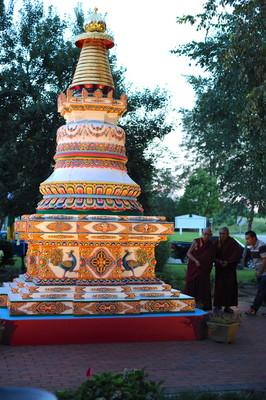First, I would like to mention that in our daily lives, what we wish is happiness and what we do not wish is suffering. How do we stop the sufferings that we don’t like and always achieve the happiness that we like? We have to do something about it.
Now, happiness has to come from our actions, our good karma, and that has to be motivated by the virtuous, pure thought. The pure action has to be motivated by pure thought. That’s one way of saying it.
How does an action become pure? The action has to be made pure by the pure mind. If the action is motivated by negative thoughts, then that action becomes negative. That’s the general evolution. Then, from that negative action, suffering arises, the suffering result arises. And from that virtuous thought, that pure action, the virtuous action arises, resulting only in happiness. In other words, the virtuous action is motivated by the virtuous thought.
From the medicinal seed, the medicinal plant and medicinal fruit come. From the poisonous seed planted in the ground, the poisonous plant and the poisonous fruit come. It is exactly the same with regards to happiness coming from good karma, from the pure mind, from the virtuous thought, and suffering coming from negative karma, from the negative thought.
In our daily life, that’s how it is. That’s how happiness and suffering come. That’s the only way the happiness that we wish for comes. First, we have to put in effort for the actions to become pure virtue. We have to put effort into making the mind, the attitude of that act, pure. And similarly, we have to put effort into ensuring our actions do not produce suffering. Generally, we must put effort to stop our mind being stained by ignorance, anger and attachment of this life.
But there are exceptional actions we can do, such as circumambulating holy objects, prostrating to holy objects, offering to the holy objects, besides the actual Buddha, even to paintings and statues that show the form of holy objects, such as scriptures and stupas. Even if these actions done with the holy objects are done without a Dharma motivation, even if the motivation for doing this act of circumambulating, prostrating or offering to the holy objects is done with ignorance or even with anger or attachment clinging to this life, these actions still immediately become the cause of enlightenment. Even though these actions are done out of ignorance, anger or the attachment clinging to this life, they immediately become the cause of enlightenment.
For example, offering one stick of incense, one tiny grain of rice or one tiny flower to a statue or painting of a buddha, no matter what size it is, whether it is a tiny one or as big as a mountain, as long as the holy object—this statue, scripture, stupa or whatever—signifies the Buddha’s holy body, holy speech and holy mind, that action immediately becomes the cause of enlightenment. That means, by the way, it becomes the cause to achieve liberation from samsara for ourselves and, by the way, the cause to achieve a good rebirth in the god or human realm, not just once but for hundreds of thousands of lifetimes. We achieve a good rebirth like this for so many lifetimes from this one good karma.
This is because we collect so much merit doing this action that it not only has all these positive results in so many future lives, besides liberation and enlightenment, it becomes the cause of success in this life, health, long life, wealth, and so forth. And because it purifies negative karma, the difficulties and problems of this life decrease. So, there’s an effect even in this life.





























